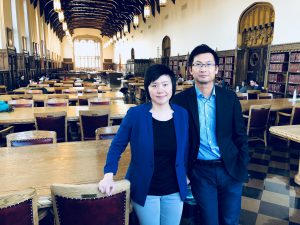Back from Washington DC — now meeting with GLO friends in the Cologne-Bonn region.

Ends;
Back from Washington DC — now meeting with GLO friends in the Cologne-Bonn region.

Ends;
Migration between South America and the United States has become an issue of rising interest. In this context, a project supported by the Inter-American Development Bank (IDB) has highest importance that investigates, documents and analyzes the international migration dynamics in Mexico, Central America and the Dominican Republic. It studies the labor markets, economic integration and migration in the Central American region, fiscal impacts of migration, and the role of remittances. Of particular interest are case studies on Mexico, Costa Rica, Panama, the Northern Triangle and US-Mexican migration.
As part of a team of advisors Klaus F. Zimmermann (UNU-MERIT, Maastricht University and Bonn University), who is also the President of the Global Labor Organization (GLO), has visited the Headquarters of the IDB on February 9, 2018. A number of analysts supporting this important research project are GLO Fellows and were also present in the intensive all-day workshop. Results of the research will be made available in summer 2018.
Zimmermann in front of the bank in Washington DC.

Ends;
The Kuznets Prize is a prestigious scientific award given by the Journal of Population Economics for the best paper published in the Journal. The Kuznets Prize 2018 has been awarded to Chunbei Wang and Le Wang of the University of Oklahoma for their article:
“Knot yet: Minimum marriage age law, marriage delay, and earnings”
The article was published in the Journal of Population Economics (2017), 30(3), pp. 771-804. (The article is freely accessible for one months after the dinner event. Just click on the title above. For all the details about the prize and the article content see also here.)
The Prize was presented at a dinner event of the Global Labor Organization (GLO) in Washington DC on February 8, 2018. In a ceremony, Le Wang received the Prize Certificate from the Editor-in-Chief of the Journal, Klaus F. Zimmermann, who is also the President of GLO.
From the left: Hai-Anh H. Dang (World Bank), Brian W. Sloboda (US Department of Labor), Barry Chiswick (George Washington University), Carmel Chiswick (George Washington University), Emmanuel Abuelafia (Inter-American Development Bank), Miryam Hazan (Inter-American Development Bank), Le Wang (Oklahoma University), Klaus F. Zimmermann (UNU-MERIT, Maastricht University & Bonn University) and Don Parsons (George Washington University).

Ends;
The Kuznets Prize 2018 will be awarded to Chunbei Wang and Le Wang of the University of Oklahoma. The prize will be given at a dinner event of the Global Labor Organization (GLO) in Washington DC on February 8, 2018. GLO supports the Journal of Population Economics, and the Editor-in-Chief of the Journal, Klaus F. Zimmermann (UNU-MERIT, Maastricht), who is also the President of GLO, is presenting the prize.
Chunbei Wang and Le Wang of the University of Oklahoma receive the 2018 Kuznets Prize for their article “Knot yet: Minimum marriage age law, marriage delay, and earnings,” which was published in the Journal of Population Economics (2017), 30(3), pp. 771-804. The annual prize honors the best article published in the Journal of Population Economics in the previous year. The article editor of the paper has been Junsen Zhang (Hongkong University) supported by his team of anonymous referees.
What does the article say?
There is a causal effect of marriage delays on earnings, with a stronger impact for females than for males. This works almost exclusively through more education for both men and women.
1 Biographical Abstracts
Chunbei Wang is an Assistant Professor of Economics at the University of Oklahoma and a Fellow at the Global Labor Organization (GLO). Before that, she was an Assistant Professor at Birmingham-Southern College and the University of Massachusetts Dartmouth. She obtained her Ph.D. degree from the University of Texas at Dallas in 2008 and her bachelor’s degree from Jinan University in Guangzhou, China in 2001.
Her research focuses on immigration, entrepreneurship, gender, minorities, and family. Her work has been published in the Journal of Population Economics, Journal of Environmental Economics and Management, Research in Labor Economics, and Industrial Relations, among others.
Le Wang is Chong K. Liew Chair and Associate Professor of Economics at the University of Oklahoma, as well as a Fellow at Global Labor Organization and IZA. He also serves as an Associate Editor of Econometric Reviews and Journal of Labor Research. He also holds a special term professorship at Jinan University. Prior to joining OU, he has held positions at the University of Alabama, the University of New Hampshire, and University of Minnesota. He was also a Women and Public Policy Fellow at Harvard Kennedy School. He received his Ph.D in Economics from Southern Methodist University in 2006 and his B.A. in International Finance from Jinan University, Guangzhou, China in 2001.
His research focuses on questions in the subfields of microeconomics—labor and demographic economics, development economics and public economics—with a particular emphasis on the development and use of distributional/nonparametric and program evaluation methods to address issues in these areas. His work has been published in journals such as Journal of Political Economy, Journal of Econometrics, Journal of Applied Econometrics, Journal of Population Economics, Journal of Environmental Economics and Management Econometrics Journal, Economic Development and Cultural Change, Health Economics, and Industrial Relations.

GLO Fellows Chunbei Wang and Le Wang of the University of Oklahoma
2 Abstract of the Winning Paper
“Despite the historical highs for age at first marriage, little is known about the causal relationship between marriage delay and wages, and more importantly, the mechanisms driving such relationship. We attempt to fill the void. Building on an identification strategy proposed in Dahl (Demography 47:689–718, 2010), we first establish the causal wage effects of marriage delay. We then propose ways to distinguish among competing theories and hypotheses, as well as the channels through which marriage delay affects wages. Specifically, we take advantage of their different implications for causal relationship, across gender and sub-populations. We reach two conclusions. First, we find a positive causal impact of marriage delay on wages, with a larger effect for women. Comparison of IV and OLS estimates suggests that the observed relationship between marriage delay and wages is attributed to both selection in late marriages and true causal effects. Second, we find strong evidence that the positive, causal effects are almost exclusively through increased education for both men and women.”
3 About the Kuznets Prize
The Journal of Population Economics awards the ‘Kuznets Prize’ for the best paper published in the Journal of Population Economics in the previous year. Starting from 2014 the Prize has been awarded annually. Papers are judged by the Editors of the Journal.
Simon Kuznets, a pioneer in population economics, Professor Emeritus at Harvard University and the 1971 Nobel Prize laureate in economics, died on July 10, 1985. Professor Kuznets was born 1901 in Pinsk, Belarus, and came to the United States in 1922. He earned his Bachelor of Science in 1923, a Master of Arts degree in 1924 and his doctorate in 1926, all from Columbia University. During World War II he was Associate Director of the Bureau of Planning and Statistics on the War Production Board, and he served on the staff of the National Bureau of Economic Research from 1927 to 1960. Mr. Kuznets was a faculty member at the University of Pennsylvania for 24 years and Professor of Political Economy at Johns Hopkins University from 1954 until he joined Harvard University in 1960. He retired in 1971 and was given the title of George F. Baker Professor Emeritus of Economics. He was a former president of the American Economic Association and the American Statistical Association.
4 Previous Winners
The Kuznets Prize has previously been awarded to:
2017: Binnur Balkan (Stockholm School of Economics) and Semih Tumen (Central Bank of the Republic of Turkey) for their article “Immigration and prices: quasi-experimental evidence from Syrian refugees in Turkey,” Journal of Population Economics 29(3): pp. 657-686.
2016: Loren Brandt (University of Toronto), Aloysius Siow (University of Toronto), and Hui Wang (Peking University) for their article “Compensating for unequal parental investments in schooling,” Journal of Population Economics 28: 423-462.
2015: Haoming Liu (National University of Singapore) for his article “The quality–quantity trade-off: evidence from the relaxation of China’s one-child policy”, Journal of Population Economics 27: 565-602.
2014: Paolo Masella (University of Essex) for his article “National Identity and Ethnic Diversity”, Journal of Population Economics 26: 437-454.
Period 2010-2012: Richard W. Evans (Brigham Young University), Yingyao Hu (Johns Hopkins University) and Zhong Zhao (Renmin University) for their article “The fertility effect of catastrophe: US hurricane births”, Journal of Population Economics 23: 1-36.
Period 2007-2009: Makoto Hirazawa (Nagoya University) and Akira Yakita (Nagoya University) for their article ” Fertility, child care outside the home, and pay-as-you-go social security “, Journal of Population Economics 22: 565-583.
Period 2004-2006: Jinyoung Kim (Korea University) received the Kuznets Prize for his article “Sex selection and fertility in a dynamic model of conception and abortion,” Journal of Population Economics 18: 041-067.
Period 2001–2003: Olympia Bover (Bank of Spain) and Manuel Arellano (CEMFI), for their article “Learning about migration decisions from the migrants: Using complementary datasets to model intra-regional migrations in Spain”, Journal of Population Economics 15:357–380.
Period 1998–2000: David C. Ribar (George Washington University), for his article “The socioeconomic consequences of young women’s childbearing: Reconciling disparate evidence”, Journal of Population Economics 12: 547–565.
Period 1995–1997: James R. Walker (University of Wisconsin-Madison), for his article “The effect of public policies on recent Swedish fertility behavior”, Journal of Population Economics, 8: 223–251.
Editor-in-Chief Klaus F. Zimmermann, GLO President

Ends;
Facts or myth? Lazy Greeks, hard working Germans or Americans? Japanese facing death from overwork – “karoshi”?
The facts provide a different picture. The OECD – based chart below shows the share of workers in 2015 working 60 or more hours per week in their main job. In spite of well-known myths, the countries with the by far largest share of workers working long are Turkey (22.3%) and South Korea (22.6%) and not the United States (3.8%) and Germany (3.3%).

https://www.statista.com/chart/12785/where-the-most-workers-put-in-a-60-hour-week/
GLO President Klaus F. Zimmermann

Ends;
Both women and men likewise are more satisfied with younger marital partners and less satisfied with older ones. Marital satisfaction for a younger partner which is initially higher than for similar aged couples declines relatively with marital duration and converges within six to ten years of marriage. This is explained by the hypothesis that differently aged couples are less resilient to negative shocks compared to similarly aged couples.
Important and open for debate!
These findings are derived in the just available and freely accessible lead article in the Journal of Population Economics:
Authors: Wang-Sheng Lee and Terra McKinnish
Deakin University, Australia & University of Colorado, USA
Journal of Population Economics (2018), Vol. 31:2, pp 337-362
The Journal of Population Economics is the leading academic journal in economic demography. Klaus F. Zimmermann, President of the Global Labor Organization (GLO), one of the organizations supporting the Journal, is the Editor-in-Chief. He says: “We thank the brilliant authors for an excellent analysis of a very timely question with thought-provoking insights and the article Editor, GLO Fellow Alessandro Cigno, University of Florence, with his anonymous academic referees, for their important work.” Both authors are also GLO Fellows.
The study uses the famous Australian Hilda data set administered at the Melbourne Institute, University of Melbourne, which Zimmermann had visited in November and December 2017.
Zimmermann nearby the Melbourne Museum.
For the complete new issue of the Journal of Population Economics see the outline and the link to the single articles below:
The Global Labor Organization (GLO) is pleased to present the table of contents alert for a new issue of the Journal of Population Economics. Volume 31 Number 2 is now available online.
Wang-Sheng Lee & Terra McKinnish: The marital satisfaction of differently aged couples
Anne Ardila Brenøe & Ramona Molitor: Birth order and health of newborns
Neeraj Kaushal & Felix M. Muchomba: Missing time with parents: Disease risk and fertility: evidence from the HIV/AIDS pandemic
Yoo-Mi Chin & Nicholas Wilson: Disease risk and fertility: evidence from the HIV/AIDS pandemic
Jacobus de Hoop, Patrick Premand, Furio Rosati & Renos Vakis: Women’s economic capacity and children’s human capital accumulation
Gigi Foster & Leslie S. Stratton: Do significant labor market events change who does the chores? Paid work, housework, and power in mixed-gender Australian households
Ildefonso Mendez & Gema Zamarro: The intergenerational transmission of noncognitive skills and their effect on education and employment outcomes
Nora Gordon & Sarah Reber: The effects of school desegregation on mixed-race births
Catalina Amuedo-Dorantes & Thitima Puttitanun: Undocumented youth in limbo: the impact of America’s immigration enforcement policy on juvenile deportations
Louis-Philippe Beland & Bulent Unel: The impact of party affiliation of US governors on immigrants’ labor market outcomes

Ends;
The research journal Comparative Economic Studies has recently announced the appointment of Professor Nauro Campos (Brunel University London and GLO) as the incoming Editor. Prof. Campos has taken over editorship of the journal from Profs. Paul Wachtel and Josef Brada.
Nauro Campos is Professor of Economics at Brunel University London and Research Professor at ETH-Zürich. He is also a Fellow of the Global Labor Organization (GLO). His main research interests include political economy and European integration.
Prof. Campos has appointed a new Editorial Board for the journal including GLO Fellow François Bourguignon, Paris School of Economics, France, and GLO – President Klaus F. Zimmermann (picture below at the Australian beach during a recent research visit), UNU-MERIT, Maastricht University and Bonn University.

Ends;
REMINDER: Call for papers for a special issue of the International Journal of Manpower on: “Sexual Orientation and the Labor Market”
Submissions will be accepted until August 31, 2018.
Edited by
Nick Drydakis (Anglia Ruskin University, University of Cambridge, IZA, and GLO) and Klaus F. Zimmermann (UNU-MERIT, Maastricht University, CEPR and GLO)
An initiative of the Global Labor Organization (GLO), this project is related to the GLO Thematic Cluster on “Gender, Gender Identity, Sexual Orientation and Labor Market Outcomes” headed by Nick Drydakis.
Despite the enactment, in English speaking countries and the EU, of labor legislation against discrimination in the labor market based on sexual orientation, LGBTI (lesbian, gay, bisexual, trans and intersex) people continue to experience occupational access constraints, lower job satisfaction, wage discrimination (especially gay men), and more bullying and harassment than their heterosexual counterparts (Drydakis, 2014; Valfort, 2017).
Studies for the period 1989–2014 suggest that gay men receive lower wages than heterosexual men of comparable education, skills, and experience. For instance, studies find that gay men earn from 4–5% less than heterosexual men in the Netherlands, France, Greece, and the UK and up to 12–16% less in Canada, Sweden, and the US (Drydakis, 2014). Whether wage discrimination against gay men exists in other regions is of great interest and ascertaining this is of importance for policy interventions. In addition, whether wage discrimination lessens over time in response to policy interventions and legislation is hard to determine in the absence of relevant studies. It is not yet clear whether prejudice-based and/or statistical discrimination is the more appropriate framework for the study of labor discrimination against LGBTI people.
The available studies on sexual orientation and job satisfaction highlight that in Australia, Canada, and Greece, both gay men and lesbians experience lower job satisfaction than do their otherwise similar heterosexual counterparts (Drydakis, 2014). Because gay and lesbian employees face severe workplace harassment and bullying, these conditions may affect their workplace experience evaluations (Drydakis, 2014). Whether factors other than workplace harassment cause gay and lesbian employees’ dissatisfaction requires examination. Also, for instituting appropriate policy actions, it is important to determine whether these job satisfaction differences suffered by sexual orientation minorities exist in other countries.
In general, the dearth of studies makes it difficult to examine how education, occupation, industrial relations, region, core socio-economic characteristics, personality and mental health traits moderate the relationship between sexual orientation and labor market outcomes (Drydakis, 2014). Indeed, although studies suggest that lesbians face prejudice in the labor market, some studies estimate that lesbians earn more than comparable heterosexual women. Lesbians have been found to earn 3% more in the Netherlands, 8% more in the UK, 11% more in Germany, 15% more in Canada, and 20% more in the US. Whether personality characteristics, coping strategies, occupational choices, family structures and/or region positively affect lesbians’ wages is still an open question.
In addition, quantitative research on employment outcomes is scarce for trans people (Drydakis, 2017). A representative study suggests that trans people tend to suffer higher unemployment rates than those reported, in other studies, for the general U.S. population (Leppel, 2016). In addition, the interaction between trans identity, and sexual orientation, and the effects of this on employment outcomes is under-examined (Drydakis, 2017). Whether explicit, legislative employment protection against discrimination on the ground of a trans identity has an effect on employment outcomes has also received little attention (Drydakis, 2017).
Given the aforementioned lack of sufficient literature, the editors welcome empirical papers on labor economics which have a clear and highlighted added value, and solid policy implications, on the following general areas:
Submissions will be accepted until the 31th of August 2018. They should be made using ScholarOne Manuscripts, the online submission and peer review system: http://mc.manuscriptcentral.com/ijm. Before submission, please verify that you have carefully read the Author guidelines of the Journal. While making your submission, please specify the title of the current call for papers. See also the forthcoming call on the journal website.
Nick Drydakis (Anglia Ruskin University, University of Cambridge, IZA and GLO)
and Klaus F. Zimmermann (UNU-MERIT, Maastricht University, CEPR and GLO)

References:
Drydakis N. (2014). Sexual orientation and labor market outcomes. IZA World of Labor: 111. DOI: 10.15185/izawol.111
Drydakis N. (2017). Trans people, well-being, and labor market outcomes. IZA World of Labor: 386. DOI: 10.15185/izawol.386
Leppel, K. (2016). The labor force status of transgender men and women. International Journal of Transgenderism, Vol. 17, No. (3−4), pp. 155−164.
Valfort, M. (2017). LGBTI in OECD countries: A review. OECD Social, Employment and Migration Working Papers, No. 198, OECD Publishing, Paris. DOI: 10.1787/d5d49711-en
Ends;
Bonn – Deutschland. Sonntag, 21. Januar 2018
“Die Sozialdemokraten haben auf ihrem außerordentlichen Parteitag in Bonn mit quälender Mehrheit die Aufnahme von Koalitionsverhandlungen mit der Union beschlossen. Es ist zu hoffen, daß der ökonomische und politische Musterknabe Deutschland bald wieder in die Spielhölle der EU- und Welt – Politik zurückkehrt. Das Land mit handlungsfähiger Regierung wird dort als stabilisierender Faktor dringend gebraucht.
Das war knapp und nicht unerwartet problematisch. Denn die SPD hat als Partei (auch schon zu Zeiten der Musterkanzler Schmidt und Schröder, nicht erst in den großen Koalitionen mit Merkel) die strukturell verankerte Neigung, sich Regierungsverantwortung zu verweigern. Ganz gleich, welche Regierungsleistungen sozialdemokratische Kanzler oder Minister auch zu verantworten hatten. Dies wird durch die Richtungsentscheidung von heute nicht gelöst. Im Gegenteil.
Die Knappheit des Ergebnisses, nur erzielt durch einen massiven Einsatz des breiten links-rechts Establishments der SPD, belegt, wie groß die Herausforderung der Führung der Partei ist. Wahrscheinlich kann diese Aufgabe nur durch eine Person geleistet werden, die nicht gleichzeitig Regierungsmitglied ist.
Die SPD hat heute nochmals eine Bewährungschance erhalten. Sollte sie dennoch am Ende in die Opposition gehen, so werden die darauf wahrscheinlich folgenden Neuwahlen diese Partei weiter zerfallen lassen. Für die Union unter Kanzlerin Merkel könnte das bedeuten, weiter an Stärke zu gewinnen. Nach einem Wahlsieg der CSU in Bayern könnte auch eine bundesweite Koalition mit den Grünen unter ihrer Führung wieder denkbar werden. Es bleibt spannend.”
Klaus F. Zimmermann ist Wirtschaftsprofessor der Universität Bonn (em.) und Präsident der Global Labor Organization (GLO). Er war Präsident des Deutschen Instituts für Wirtschaftsforschung (DIW Berlin) und Gründungsdirektor des Instituts zur Zukunft der Arbeit (IZA).
Zimmermann am Sonntag vor dem Tagungsort des SPD Parteitages im Bonner Konferenzzentrum am Rhein.

Ends;
The International Journal of Manpower together with the Global Labor Organization (GLO) is preparing a Special Issue on:
“The School to Work Transition: Cross-Country Differences, Evolution and Reforms”.
Submissions are invited until February 15, 2018.
The special issue is edited by Francesco Pastore (University of Campania “Luigi Vanvitelli” and GLO) and Klaus F. Zimmermann (UNU-MERIT, Maastricht University and GLO). This project is related to the GLO Thematic Cluster on “School-to-Work Transitions” headed by Francesco Pastore. Interested GLO network members are invited to contribute to both ventures, but the Special Issue is open to submissions from all authors of qualified articles dealing with relevant aspects of the broadly defined topic.
Please study a very detailed outline of the CALL HERE or on the Journal page.
Pastore (left) and Zimmermann discussing the Special Issue project during a joint GLO mission 2017 in Brasov/Romania.

Ends;